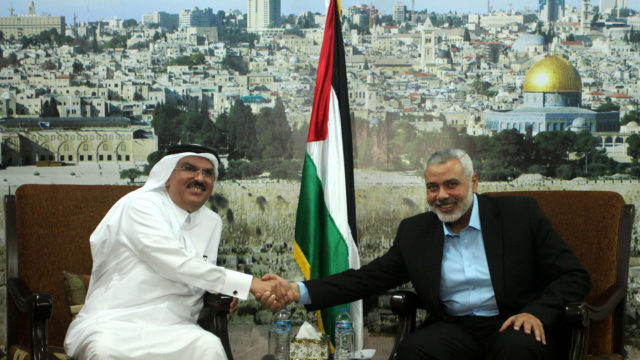
The head of Qatar’s Committee for the Reconstruction of Gaza, Mohammed al-Emadi, recently visited the Gaza Strip to reaffirm Qatar’s commitment to its people and government. Al-Emadi’s trip, which began June 6, brought with it a $3 million commitment to rebuilding the homes for 600 Palestinian families in the Gaza Strip.
The families chosen to benefit from the rebuilding were deemed some of the poorest in Gaza. The project, however, is just a small fraction of the $1.4 billion Qatar has pledged to give to Gaza over five years.
Naji Sarhan, the Palestinian undersecretary of the Ministry of Public Works and Housing, praised al-Emadi’s visit, which has come amidst a humanitarian crisis for Palestinian Arabs in Gaza. Just recently, the Palestinian Authority (PA) has cut Hamas leaders’ paychecks and refused to continue paying Israel for electricity supplied to Gaza. Shortly after the PA’s announcements, Israel acquiesced to PA officials requests and reduced its electricity supply to Gaza. Both actions have put Hamas (the Islamic Resistance Movement, rival to the PA’s key party, Fatah) under great pressure.
Qatar also has suffered a crisis of its own from the blockade that four of its Sunni Muslim neighbors established when they cut ties with the small, natural gas and oil-rich country for supporting terrorist groups. Yet, the blockade by Saudi Arabia, Egypt, the United Arab Emirates and Bahrain has not caused Qatar to retreat from its original positions. Rather, the $1.4 billion pledge to Gaza has reaffirmed its initial commitments. Al-Emadi echoed this position during his trip: “[Gaza] will not be affected.”
Analysts and diplomats abroad originally had expected that due to the crises in Qatar and Gaza, Hamas would begin to suffer financially and diplomatically. Surprisingly, however, it has not. Instead, Egypt has come to the rescue, aiding the enclave’s rulers by providing some energy supplies.
Egypt’s support seems somewhat contradictory, given the fact that it was one of the four countries that blockaded Qatar for supporting Islamists organizations, like Hamas, the Palestinian branch of Egypt’s banned Muslim Brotherhood. However, the more Egypt aids Gaza, the greater amount of influence it can yield, which is a plus in the eyes of Sunni states. For this reason, at least in party, Qatar was able to announce its new $1.4 billion infrastructure package.

